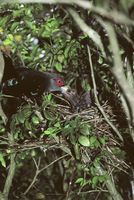|
| 질의: phaenicophaeus sumatranus | 결과: 6번째/8 | |
The Chestnut-bellied Malkoha (Phaenicophaeus sumatranus) builds its nest in trees. Made of twigs lodged between the forks of branches, the nest is neatly lined with green leaves (left). In it the female lays two white, glossless eggs.
| 제목: | The Chestnut-bellied Malkoha (Phaenicophaeus sumatranus) builds its nest in trees. Made of twigs lodged between the forks of branches, the nest is neatly lined with green leaves (left). In it the female lays two white, glossless eggs.
| | 출처: | http://besgroup.talfrynature.com/category/brood-... |
|

| 해상도: 300x448
파일크기: 40877 Bytes
촬영일: 2007:12:31 15:41:04
등록시간: 2008:03:26 22:15:09
|
The Chestnut-bellied Malkoha (Phaenicophaeus sumatranus) builds its nest in trees. Made of twigs lodged between the forks of branches, the nest is neatly lined with green leaves (left). In it the female lays two white, glossless eggs.
Bird Ecology Study Group » Brood parasitism
The Chestnut-bellied Malkoha (Phaenicophaeus sumatranus) builds its nest in trees. Made of twigs lodged between the forks of branches, the nest is neatly lined with green leaves (left). In it the female lays two white, glossless eggs.
This malkoha is a cuckoo, but unlike most cuckoos from this region, it actually builds its own nest and takes care of its young.
Cuckoos (Family Cuculidae) are notorious for taking advantage of other bird species to look after their young – from nest building to egg incubation to chick rearing. This is what ornithologists call brood or nest parasitism. One common brood parasite many birders are familiar with is the Asian Koel (
|
 |

|

|
phaenicophaeus sumatranus
6/8 |

|
 |
^o^
동물그림창고 똑똑전화 누리집
^o^
|
|